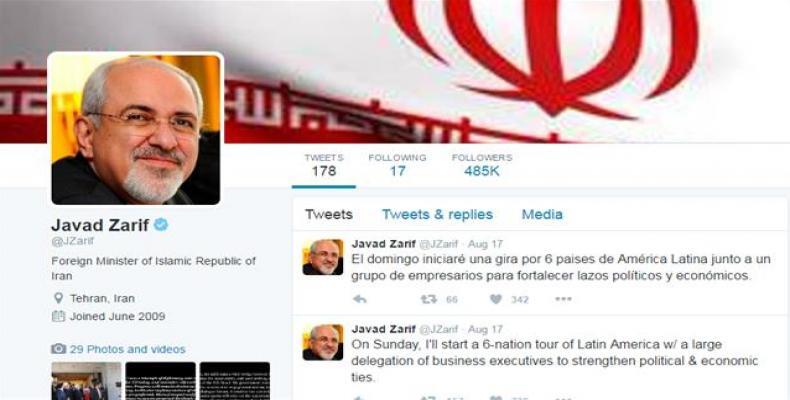Tehran, December 5 (RHC)-- Iran's Foreign Minister Mohammad Javad Zarif says a letter written to the UN chief by three European signatories to the 2015 nuclear deal with Tehran -- officially known as the Joint Comprehensive Plan of Action (JCPOA) -- is aimed at hiding their “miserable incompetence” in fulfilling their commitments under the accord.
Zarif made the remarks in a Thursday tweet in which he said: “Latest E3 letter to UNSG on missiles is a desperate falsehood to cover up their miserable incompetence in fulfilling bare minimum of their own #JCPOA obligations.”
Having failed to fulfill their commitments to Iran under the JCPOA, the European signatories to the deal wrote a letter to UN Secretary General Antonio Guterres, which was circulated on Wednesday, accusing Tehran of possessing “nuclear-capable ballistic missiles” and claiming that the country’s latest missile activities are “inconsistent” with a UN resolution that endorsed the accord.
In that letter, UN ambassadors from France, the UK and Germany claimed that “Iran’s developments of nuclear-capable ballistic missiles” go against a 2015 UN resolution calling on Tehran not to undertake any activity involving such missiles.
UN Security Council Resolution 2231 endorsed the multilateral nuclear accord, which was signed between Iran and six major world powers — also including the U.S., Russia, and China. Britain, France and Germany claim Iran has “nuclear-capable ballistic missiles” and that its latest missile activities are “inconsistent” with a UN resolution that endorsed the accord.
In another part of his tweet, Zarif chided the three European countries for giving in to U.S. pressures on Iran and failing to compensate for Washington’s unilateral withdrawal from the JCPOA, which was followed by re-imposition of "the toughest ever" sanctions on Tehran.
“If E3 want a modicum of global credibility, they can begin by exerting sovereignty rather than bowing to U.S. bullying,” Zarif said.
U.S. President Donald Trump pulled his country out of the JCPOA in May 2018 and re-imposed harsh sanctions against Iran, calling for a “new deal” that would address Iran’s national missile program and its anti-terrorism role in the region.
The European signatories vowed to make efforts to compensate for Washington’s withdrawal and shield their business links with Iran from the American sanctions. Those promises, however, were never delivered as Europe gave into America’s pressure, prompting Tehran to resort to Articles 26 and 36 of the JCPOA on its legal rights and suspend parts of its commitments under the supervision of the International Atomic Energy Agency (JCPOA).
Zarif also published another tweet later on Thursday, in which he released the complete text of a letter sent to the UN chief as well as the President of the Security Council Kelly Craft a day earlier by the head of Iran's mission to the United Nations Majid Takht Ravanchi.
“Detailed, legal rebuttal of the E3 letter to the UN by Iran's Ambassador and Permanent Representative,” Zarif wrote before giving the full text of the letter. In that letter, Iran's ambassador to UN had rebutted claims leveled by the EU3 against Iran's missile activities, noting that the countries activities “related to space launch vehicles and ballistic missiles fall outside of the purview of competence of Resolution 2231 (2015) and its annexes.”
The letter added: “….given the mandate set forth in the note by the President of the Security Council on Security Council tasks under Resolution 2231 …, the secretary general is therefore expected to avoid reporting on such irrelevant activities in his reports on the implementation of that resolution.”
“At the same time, the international community must be extremely vigilant regarding the politically motivated approach by the United Nations and certain other industrialized countries, which, under such absurd pretexts as proliferation concerns, attempt to demonize benign technologies such as space technology that are critical for the socioeconomic development of all nations, particularly developing countries.”
Iran's ambassador to UN concluded by saying: “I would like to stress once against that Iran is determined to resolutely continue its activities related to ballistic missiles and space launch vehicles, both of which are within its inherent rights under international law and are necessary for securing its security as well as socioeconomic interests.


